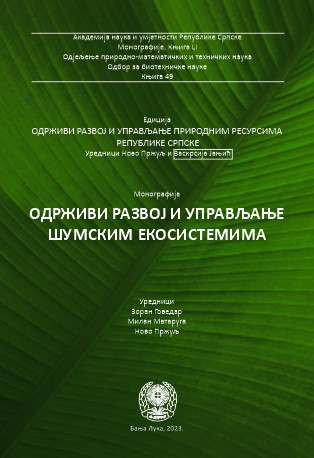The Republic of Srpska forestry innovative opportunities in green economy and climate change
DOI:
https://doi.org/10.7251/EORU2305713CKeywords:
Green, circular and bio economy,, sustainable development, wood processing, ecotourism, carbon credits, plantation production, biomass, non-wood forest productsAbstract
Current economic models based on fossil resources and the concept of highpressure growth endangers not only life on our planet, but also the world economy. The need to respond to the unprecedented COVID-19 crisis represents a unique opportunity for transition to a sustainable economy focused on the well-being of people and nature. Green, circular and bio economy provide a conceptual framework for the use of renewable natural resources for holistic transformation and the management of land, food, health care and industrial systems with the aim to achieve sustainable development in harmony with nature. There are many innovative activities harmonized with the concept of green economy that can be conducted in the forestry sector. In addition to the traditional use of wood as a raw material in wood processing industry, some of the examples of innovative activities are the following: carbon projects, biomass as an energy source, plantation production and the use of other forest products. No other sector provides such long-term and multidimensional positive effects. Considering the role of forests and forestry sector in our region, one of the main obstacles to the adoption of new concepts lies in the fact that forests are often seen exclusively as a wood source for different needs. Logs, and more recently biomass as well, have been the focus of forest benefits, while many other benefits have not been properly defined or evaluated. In order to change the current paradigm, it is necessary to constantly promote the fact that forests are the largest green infrastructure in the region and the largest source of terrestrial biological resources. They can provide a wide range of ecosystem services and play a significant but often underestimated role in the overall economy. Focusing on the territory of the Republika Srpska, it is certain that forests and forest land provide a large number of ecosystem services and products, which can significantly contribute to achieving the goals of green economy. The main goals are related to climate change (through adaptation and mitigation) and the use of renewable energy sources, as well as to other sectors such as ecotourism, construction, rural development, agroforestry, urbanforestry, water management, textile and chemical industry, use of other forest products, hunting, the use of forest ecosystems for health purposes, pharmacy, etc. In order to fully exploit the RS forestry potentials in green, circular and bio economy on a sustainable basis, it is necessary to continue a deep transformation in terms of planning, management, control and sustainable use of natural resources.
